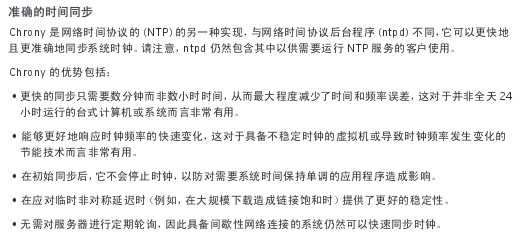RHEL7 -- 使用Chrony设置时间与时钟服务器同步
2015-08-17 12:05 abce 阅读(46972) 评论(0) 编辑 收藏 举报Chrony是一个开源的自由软件,它能保持系统时钟与时钟服务器(NTP)同步,让时间保持精确。
它由两个程序组成:chronyd和chronyc。
chronyd是一个后台运行的守护进程,用于调整内核中运行的系统时钟和时钟服务器同步。它确定计算机增减时间的比率,并对此进行补偿。
chronyc提供了一个用户界面,用于监控性能并进行多样化的配置。它可以在chronyd实例控制的计算机上工作,也可以在一台不同的远程计算机上工作。

安装、配置chrony
# systemctl enable chronyd.service # systemctl restart chronyd.service # systemctl status chronyd.service 查看时间同步源: # chronyc sources -v 210 Number of sources = 1 .-- Source mode '^' = server, '=' = peer, '#' = local clock. / .- Source state '*' = current synced, '+' = combined , '-' = not combined, | / '?' = unreachable, 'x' = time may be in error, '~' = time too variable. || .- xxxx [ yyyy ] +/- zzzz || / xxxx = adjusted offset, || Log2(Polling interval) -. | yyyy = measured offset, || \ | zzzz = estimated error. || | | MS Name/IP address Stratum Poll Reach LastRx Last sample =============================================================================== ^? ys-ad1.ys.com 3 6 3 1 +12ms[ +12ms] +/- 268ms 查看时间同步源状态: # chronyc sourcestats -v 210 Number of sources = 1 .- Number of sample points in measurement set. / .- Number of residual runs with same sign. | / .- Length of measurement set (time). | | / .- Est. clock freq error (ppm). | | | / .- Est. error in freq. | | | | / .- Est. offset. | | | | | | On the -. | | | | | | samples. \ | | | | | | | Name/IP Address NP NR Span Frequency Freq Skew Offset Std Dev ============================================================================== ys-ad1.ys.com 4 3 6 -939.214 56272.109 -4371us 5267us
配置chrony
当Chrony启动时,它会读取/etc/chrony.conf配置文件中的设置
参数文件说明:
# cat /etc/chrony.conf # 该参数可以多次用于添加时钟服务器,必须以"server "格式使用。一般而言,你想添加多少服务器,就可以添加多少服务器。 server 0.rhel.pool.ntp.org iburst server 1.rhel.pool.ntp.org iburst server 2.rhel.pool.ntp.org iburst server 3.rhel.pool.ntp.org iburst # Ignore stratum in source selection. # stratumweight指令设置当chronyd从可用源中选择同步源时,每个层应该添加多少距离到同步距离。默认情况下,设置为0,让chronyd在选择源时忽略源的层级。 stratumweight 0 # Record the rate at which the system clock gains/losses time. # chronyd程序的主要行为之一,就是根据实际时间计算出计算机增减时间的比率,将它记录到一个文件中是最合理的,它会在重启后为系统时钟作出补偿,甚至可能的话,会从时钟服务器获得较好的估值。 driftfile /var/lib/chrony/drift # Enable kernel RTC synchronization. # rtcsync指令将启用一个内核模式,在该模式中,系统时间每11分钟会拷贝到实时时钟(RTC)。 rtcsync # In first three updates step the system clock instead of slew # if the adjustment is larger than 10 seconds. 通常,chronyd将根据需求通过减慢或加速时钟,使得系统逐步纠正所有时间偏差。在某些特定情况下,系统时钟可能会漂移过快,导致该调整过程消耗很长的时间来纠正系统时钟。该指令强制chronyd在调整期大于某个阀值时步进调整系统时钟,但只有在因为chronyd启动时间超过指定限制(可使用负值来禁用限制),没有更多时钟更新时才生效。 makestep 10 3 # Allow NTP client access from local network. # 这里你可以指定一台主机、子网,或者网络以允许或拒绝NTP连接到扮演时钟服务器的机器。 #allow 192.168.56.6 #deny 192.168/16 # Listen for commands only on localhost. # 该指令允许你限制chronyd监听哪个网络接口的命令包(由chronyc执行)。该指令通过cmddeny机制提供了一个除上述限制以外可用的额外的访问控制等级。 bindcmdaddress 127.0.0.1 bindcmdaddress ::1 # Serve time even if not synchronized to any NTP server. #local stratum 10 keyfile /etc/chrony.keys # Specify the key used as password for chronyc. commandkey 1 # Generate command key if missing. generatecommandkey # Disable logging of client accesses. noclientlog # Send a message to syslog if a clock adjustment is larger than 0.5 seconds. logchange 0.5 logdir /var/log/chrony #log measurements statistics tracking
Command Keys
在/etc/chrony.conf配置文件中,参数generatecommandkey指定了产生一个SHA1或MD5加密的密码,存放在/etc/chrony.keys中:
# cat /etc/chrony.keys 1 MD5 HEX:BD359B2633CD6105AB8820E47A8D8EAB
密码是"HEX:BD359B2633CD6105AB8820E47A8D8EAB",包含了前缀"HEX:"
可以自己指定密码,比如:
# cat/etc/chrony.keys 1 xyzzy
在/etc/chrony.conf配置文件中,参数commandkey指定了密码文件中那一条被使用。默认是1
在客户端配置时间同步服务器
1.使用命令行工具:chronyc
2.图形界面工具:system_config_date





【推荐】编程新体验,更懂你的AI,立即体验豆包MarsCode编程助手
【推荐】凌霞软件回馈社区,博客园 & 1Panel & Halo 联合会员上线
【推荐】抖音旗下AI助手豆包,你的智能百科全书,全免费不限次数
【推荐】博客园社区专享云产品让利特惠,阿里云新客6.5折上折
【推荐】轻量又高性能的 SSH 工具 IShell:AI 加持,快人一步